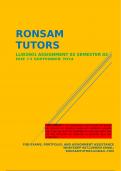RONSAM
TUTORS
LLW2601 ASSIGNMENT 02 SEMESTER 02
DUE 13 SEPTEMBER 2024
DISCLAIMER!!!: The assignments sold through this website
are intended for research, study, and reference purposes
only. They are not to be submitted as your own work. Only
use this document as reference to generate your own
assignment
FOR EXAMS, PORTFOLIO, AND ASSIGNMENT ASSISTANCE
WHATSAPP 0671189059 EMAIL:
RONSAMTUTORS@GMAIL.COM
, Vatiswa's employment situation, as presented, raises significant questions under
South African labor law, particularly in the context of the Labour Relations Act (LRA)
and the Employment Equity Act (EEA). The AI model's response is incorrect in
several respects, particularly in its suggestion that Vatiswa can directly pursue a
claim against McDonald-Kentucky Corporation (MKC) for equal pay. To provide
accurate legal advice to Vatiswa, it is essential to understand the nature of her
employment relationship, the application of South African labour laws, and the
appropriate steps she should take in addressing her predicament.
Vatiswa is employed by Tseba Taba Tsago Professionals (TTP), which operates as a
temporary employment service (TES) or labour broker under section 198 of the
Labour Relations Act 66 of 1995 (LRA). The LRA defines a TES as an entity that, for
reward, provides workers to a client, such as MKC, who performs work for the client
but is remunerated by the TES itself.1 In this case, TTP remains Vatiswa's legal
employer, responsible for her salary, tax deductions, and Unemployment Insurance
Fund (UIF) contributions. MKC is the client to whom Vatiswa has been assigned to
provide services on behalf of TTP for the last six months. Therefore, her employment
relationship is primarily with TTP, not MKC. This distinction is crucial in
understanding which party holds responsibility for any employment claims Vatiswa
might have.
The principle of "equal pay for equal work" is embedded in South African labor law
under the Employment Equity Act 55 of 1998 (EEA). Section 6(4) of the EEA
prohibits unfair discrimination in terms of conditions of employment, including
remuneration, based on arbitrary grounds such as race, gender, or any other listed
or unlisted grounds.2 However, this provision typically applies to the relationship
between an employee and their direct employer. In Vatiswa’s case, TTP is her direct
employer, not MKC. As a result, MKC's obligations under the EEA to ensure equal
pay for equal work are limited to its employees and not to employees sourced from a
TES like TTP.
While the AI model correctly identifies the concept of equal pay for equal work, it
incorrectly suggests that Vatiswa could lodge a claim directly against MKC under the
1
Labour Relations Act 66 of 1995, s 198.
2
Employment Equity Act 55 of 1998, s 6(4).




